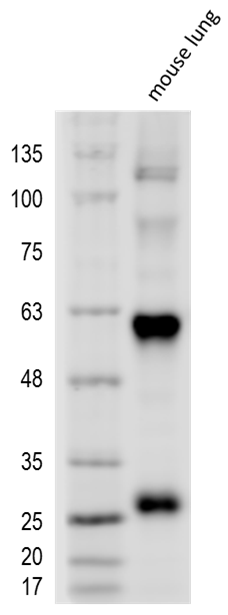Mouse Dkk-2 Antibody Summary
Ser26-Ile259
Accession # Q9QYZ8
Applications
Please Note: Optimal dilutions should be determined by each laboratory for each application. General Protocols are available in the Technical Information section on our website.
Scientific Data
 View Larger
View Larger
Dkk‑2 in Mouse Embryo. Dkk‑2 was detected in immersion fixed frozen sections of mouse embryo (15 d.p.c.) using 15 µg/mL Mouse Dkk‑2 Antigen Affinity-purified Polyclonal Antibody (Catalog # AF2435) overnight at 4 °C. Tissue was stained with the Anti-Goat HRP-DAB Cell & Tissue Staining Kit (brown; Catalog # CTS008) and counterstained with hematoxylin (blue). View our protocol for Chromogenic IHC Staining of Frozen Tissue Sections.
Preparation and Storage
- 12 months from date of receipt, -20 to -70 °C as supplied.
- 1 month, 2 to 8 °C under sterile conditions after reconstitution.
- 6 months, -20 to -70 °C under sterile conditions after reconstitution.
Background: Dkk-2
Dickkopf related protein 2 (Dkk-2) is a member of the Dickkopf family of secreted Wnt modulators (1-3). Dkk proteins contain a signal peptide and two conserved cysteine-rich domains that are separated by a linker region. The second cysteine-rich domain, which shows a configuration of cysteines conserved in prokineticin and colipase families, mediates Dkk-2 binding activities (2-4). The 226 amino acid (aa), ~35 kDa mature mouse Dkk-2 shares 41% and 34% aa identity with mouse Dkk-1 and Dkk-4, respectively. It also shares 99%, 96%, 96%, 96% and 94% aa identity with rat, human, canine, equine and bovine Dkk-2, respectively, and can activate the canonical Wnt signaling pathway in Xenopus embryos (5). Dkk proteins modify Wnt engagement of a receptor complex composed of a Frizzled protein and a low-density lipoprotein receptor-related protein, either LRP5 or LRP6 (3). When LRP6 is overexpressed, direct high-affinity binding of Dkk-2 to LRP can enhance canonical Wnt signaling (6-8). However, when Dkk-2 and LRP6 form a ternary complex with Kremen2, Wnt signaling is inhibited due to internalization of Dkk-2/LRP6/Krm2 complexes (9, 10). Thus, depending on the cellular context, Dkk-2 can either activate or inhibit canonical Wnt signaling (3). In contrast, binding of Dkk-1 or Dkk-4 to LRP is consistently antagonistic (3). Dkk proteins are expressed in mesenchymal tissues and control epithelial transformations. Dkk-2 expression has been studied most in bone and eye. Mouse Dkk-1 or Dkk-2 deficiencies have opposite effects on bone homeostasis, despite downregulating Wnt antagonism in both cases (11, 12). Dkk-2 expression is induced by Wnts in bone, and is thought to enhance bone density by promoting terminal differentiation of osteoblasts and mineral deposition (11). In contrast, Dkk-1 negatively regulates late osteoblast proliferation, which limits bone density (12). Dkk-2-deficient mice are blind due to faulty differentiation of corneal epithelium (13).
- Monaghan, A.P. et al. (1999) Mech. Dev. 87:45.
- Krupnik, V.E. et al. (1999) Gene 238:301.
- Niehrs, C. (2006) Oncogene 25:7469.
- Bullock, C.M. et al. (2004) Mol. Pharmacol. 65:582.
- Wu, W. et al. (2000) Current Biol. 10:1611.
- Mao, B. et al. (2001) Nature 411:321.
- Li, L. et al. (2002) J. Biol. Chem. 277:5977.
- Brott, B. and S.Y. Sokol (2002) Mol. Cell. Biol. 22:6100.
- Mao, B. et al. (2002) Nature 417:664.
- Mao, B. and C. Niehrs (2003) Gene 302:179.
- Li, X. et al. (2005) Nat. Genet. 37:945.
- Morvan, F. et al. (2006) J. Bone Miner. Res. 21:934.
- Mukhopadhyay, M. et al. (2006) Development 133:2149.
Product Datasheets
Citations for Mouse Dkk-2 Antibody
R&D Systems personnel manually curate a database that contains references using R&D Systems products. The data collected includes not only links to publications in PubMed, but also provides information about sample types, species, and experimental conditions.
3
Citations: Showing 1 - 3
Filter your results:
Filter by:
-
The effects of Dickkopf-4 on the proliferation, differentiation, and apoptosis of osteoblasts.
Authors: Hiramitsu S, Terauchi M, Kubota T
Endocrinology, 2013-10-08;154(12):4618-26.
Species: Mouse
Sample Types: Cell Lysates
Applications: Western Blot -
Differential activity of Wnt/beta-catenin signaling in the embryonic mouse thalamus
Authors: Krista K. Bluske, Yasuhiko Kawakami, Naoko Koyano-Nakagawa, Yasushi Nakagawa
Developmental Dynamics
-
Genomics identifies medulloblastoma subgroups that are enriched for specific genetic alterations.
Authors: Thompson MC, Fuller C, Hogg TL, Dalton J, Finkelstein D, Lau CC, Chintagumpala M, Adesina A, Ashley DM, Kellie SJ, Taylor MD, Curran T, Gajjar A, Gilbertson RJ
J. Clin. Oncol., 2006-03-27;24(12):1924-31.
Species: Human
Sample Types: Whole Tissue
Applications: IHC
FAQs
No product specific FAQs exist for this product, however you may
View all Antibody FAQsReviews for Mouse Dkk-2 Antibody
Average Rating: 5 (Based on 1 Review)
Have you used Mouse Dkk-2 Antibody?
Submit a review and receive an Amazon gift card.
$25/€18/£15/$25CAN/¥75 Yuan/¥2500 Yen for a review with an image
$10/€7/£6/$10 CAD/¥70 Yuan/¥1110 Yen for a review without an image
Filter by:


